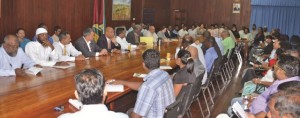As parliamentarians continue debates on Budget 2013, on Wednesday President Donald Ramotar met civil society stakeholders to discuss the budget’s priorities and to garner their feedback. There was general consensus that this year’s budget is “a people’s budget”, “a consumers’ budget”, “one that addressed the vulnerable in society” and “one that can work”.
Among those present were the Private Sector Commission (PSC), the Georgetown Chamber of Commerce and Industry (GCCI), religious organisations, trade unions, and members of the legal fraternity.




